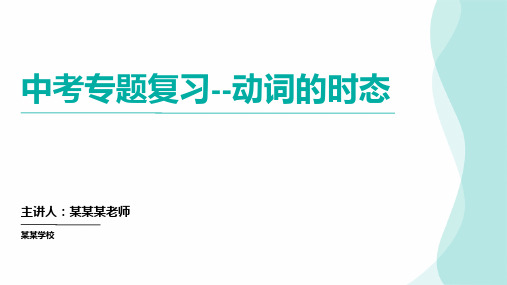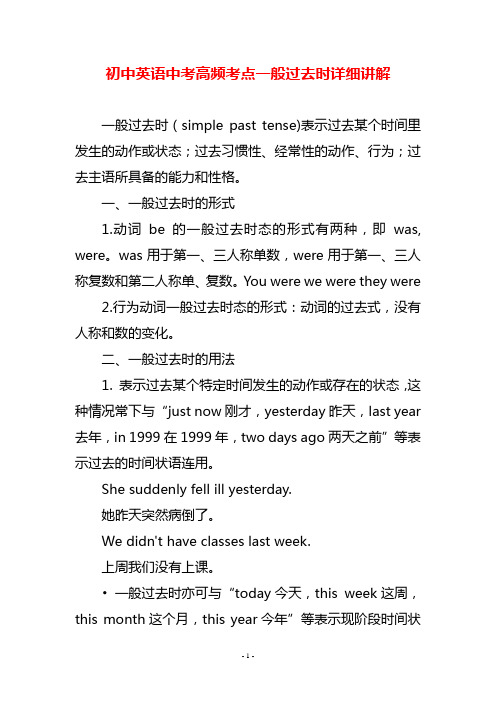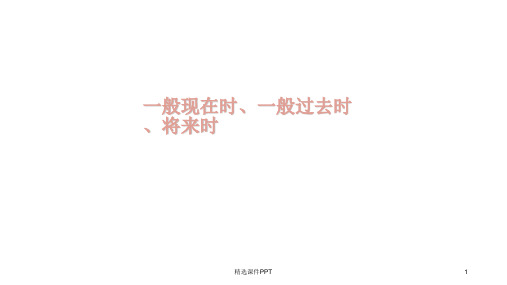中考英语专题复习 一般过去时课件
初中英语-中考时态复习-公开课精品课件-八大时态完整版

often,always,usually,sometimes, every day/week/month/year...
习惯活动 现在情况 客观事实 主将从现
I get up at six every morning. They are very busy. He needs help.
当主语不是第三人称单数时:
• 肯定句 :主语+动词原形+其它 • 否定句 :主语+don't+动词原形+其它 • 一般疑问句: Do+主语+动词原形+其它 • 特殊疑问句:特殊疑问词+一般疑问句 注意★:句式结构错则全句都错。 • 谓语动词的形式:do/does • 助动词的形式:don't(do not)/doesn't(does not)
英语时态复习
初中阶段应掌握的时态共有八种:
一般现在时、一般过去时、一般将来时 现在进行时、现在完成时 过去进行时、过去将来时、过去完成时
在英语语法中,"时"指动作发生的时间,"态"指动作的样子和状态。
一般现在时 Present Simple
What does he/she often do? What do they often do?
肯定式 I work. You work. We work. They work. He works.
疑问式
否定式
疑问否定式
Do I work?
I don't work.
Don't I work?
Do you work? You don't work. Don't you work?
中考英语专题 --八种常见动词时态讲解(共49张PPT)

二、一般过去时
1.一般过去时的结构:
主语+动词过去式+其它
I did my homework yesterday.
(did就是do的过去式) 否定构成:didn’t+动原 一般疑问构成及简答举例:Did+主语+动原+其它? 特殊疑问句举例:What did he do yesterday? When did he get up this morning?
火车明天上午六点开。
6)在复合句中,当主句是一般将来时,时间状语 从句或条件状语从句的谓语动词只能用一般现在 时来表示将来。 例如: I'll tell him the news when he comes back. 他 回来时,我将告诉他这个消息。
If you take the job , they will talk with you in greater details. 如果你接受这份工作,他们将和你谈谈细节。
I do my homework every day.
1.改为一般疑问句并回答。 Do you do your homework every day? Yes, I do./No, I don't. 2.改为否定句。 I don't do my homework every day.
Jim does his homework every day. 1.改为一般疑问句并回答。 Does Jim do his homework every day? Yes, he does./No, he doesn't. 2.改为否定句。 Jim doesn't do his homework every day.
一般过去时(12张PPT)初中英语专项复习课件

一般过去时 初中英语专项分析
一般现在时 de 应用场景
过
动作行为
去
发
生
曾经
的
存在的状态
识别 标志词 理解 句意
答题技巧
熟练 动词 转换
yesterday last week 3 days ago
动词 过去式
熟练 句型 转换
肯定 否定 疑问
一般 过去时 He played basketball yesterday.
yesterday? Yes, I did. No, I didn’t.
动词 过去式 形态的变化
一般
直接加 ed
二般
以 e 结尾,去 e 加 ed live dance hope use
动词 过去式 形态的变化
三般
重读辅元辅,双写尾字母
stop plan
四般
辅音字母 + y 结尾,把 y 变 i 加 ed cry study worry
标志词
时间状语:last night, yesterday, the day before yesterday last week, some years ago in 1995, the other day, just now, in the past
中考英语复习一般过去时

一般过去时①.用法表示过去发生的动作或存在的状态,动作结束在过去.②结构谓语动词是be<was/were>动词肯定句:主语+was/were+其它I was a student two years ago.否定句:主语+wasn't/weren't十其它I wasn't a student two years ago一般疑问句:Was/were+主语+其它Were you a student two years ago? Yes, I was.I No, I wasn't.特殊疑问句:特殊疑问词+was /were十主语+其它?Where was she then ?谓语动词是实义动词肯定句:主语十动词过去式)+其它Jim went home at6 o'clock yesterday.否定句:主语+didn't+动词(原形+其它Jim didn't go home yesterday一般疑问句:Did十主语+动词原形十其它?Did Jim go home yesterday ? Yes, he did. No, he didn't.特殊疑问句:特殊疑问词+did十主语+动词原形十其它?What did Jim do yesterday ?③时间状语(标志词)yesterday及其构成的短语:yesterday morning /afternoon / evening.. the day before yesterday.Last+时间名词:Last night/ year/month/ week/ spring段时间+ago:a moment ago. an hour ago. two days ago..短语:just now 刚刚;in the past;在过去;at the age of..........岁时once upon a time很久很久以前过去的具体时间动词过去式的变化规则(1)规则变化1.一般情况:在词尾加-edtalk →→>talked look →lookedshow →→showedstay →stayed p lay →played 2.以不发音e 结尾的单词:在词尾加-dlike →liked arrive →arrived hope →hopedsmile →smiled love →loved place →placed3.以重读闭音节结尾,且末尾只有一个辅音字母的单词:双写词尾加-edchat →chatted plan →planned stop →stopped4.辅音字母+y 结尾的单词:变y 为i 加-edstudy →studied carry →carried worry →worried(2)部分不规则变化1. 有a 则a(aught)不算多,teach,catch 就两个无a 则o(ought)三几个,bring, buy 和thinkcatch →caught teach →taught bring →brought buy →bought think →thought fight →fought2.保持原形不变:必须(must)让(let)他们放(put)下切(cut)刀来读(read)以免敲打(hit)受伤(hurt)花钱(cost)must →>must let →let put →put cut →→cutread →read hit →hit hurt →hurt cost →co3."i"就变成"a":游泳(swim)唱歌(sing)后,开始(begin) 坐(sit)下来,给(give)点喝(drink)的吧! swim →swam sing →sang begin →begansit →sat give →gavedrink →drank 4."ow/aw"就会变成"ew":长(grow)大后知道(know)不要乱扔(throw)乱吹(blow)乱画(draw) 口诀:过去式构成有规律,一般在词尾加-ed ,动词词尾有个e ,加上-d 就可以,重读闭一辅结尾,双写辅音加-ed ,辅音加y 结尾时,变y 为i 加-ed 。
2023年中考英语复习动词时态、语态 课件

He joined the League three years ago. ( 三年前入团,joined为短暂行为。)
I have finished my homework now. ---Will somebody go and get Dr. White? ---He's already been sent for.
I'd rather you came tomorrow.
4) wish, wonder, think, hope 等用过去时,作试探性 的询问、请求、建议等。如:
I thought you might have some. 我以为你想要一些。
比较:
一般过去时表示的动作或状态都已成为过去,现已 不复存在。
He is used to a vegetarian diet. Scarf is used to taking a walk.(现在习惯于散步)
典型例题
---- Your phone number again? I _A__ quite catch it. ---- It's 69568442. A. didn't B. couldn't C. don't D. can't
3) be +不定式表将来,按计划或正式安排将发 生的事。如:
We are to discuss the report next Saturday. 4) be about to +不定式,意为马上做某事。如:
He is about to leave for Beijing. 注意:be about to 不能与tomorrow, next week 等表示明确将来时的时间状语连用。
2024年中考复习时态专项(课件)

五、【过去进行时】
试卷讲评课件
1.结构:主语+be(was/were)+doing(动词的现在分词形式) 2.定义: (1)过去某一时刻或阶段正在进行的动作 They were swimming at 3:00pm yesterday. (2)表示一个动作发生时另一个动作正在进行,常与when.while等引导时 间状语的词连用 I was doing my homework while my mom is cooking. 3.时间状语:at the time of… 在…的时候 at this/that time 在这时/在那 时/ at +点钟+过去的时间.when.while等引导过去时间状语的从句
一Oh! It ________ (leave )some sweet memories in my heart in the past several months. 17.—Is Helen here?一No, she isn't here. She ________ (arrive) in half an hour.
2023年中考英语专题精品课件--动词的时态课件

A. discuss
B. discussed
C. will discuss
12. Volunteers __C___ books and toys to some village schools next Monday.
A. send
B. sent
C. will send
13. —Bob, have you finished reading the book? 时态看问句
一般现在时表示将来 表示按规定或时间表预计将发生的动作 主将从现,用在以if、as soon as、until、when oon; next week/month...(next系列); in a week、in 2024、in+一段时间; one day、in the (near) future等
一般过去时与过去进行时
过去进行时--构成 主语+was/were +动词现在分词+其他 过去进行时--用法 表示过去某一时刻正在进行或发生的动作 表示过去某一时间段内正在进行或发生的动作 在含有时间状语从句的复合句中,延续时间较长的动作用过去进行时, 另一个短暂性动作用一般过去时 表示两个延续性动作在过去某一时刻同时进行时,不考虑动作的先后顺 序,主句和从句的谓语动词都用过去进行时,连词常用while
A. am talking
B. was talking
C. were talking
4. —Is this your camera?
—Yes, I ___C_____ it for two weeks. 现在完成时
A. bought
B. had
C. have had
5. As soon as she ___A__ in Nanning, she will call you.
中考英语专题讲解课件:一般过去式复习(共30张PPT)

中考英语专题讲解课件:一般过去式 复习(共 30张PP T)
9
中考英语专题讲解课件:一般过去式 复习(共 30张PP T)
When , How, why
ThTehyewy ewnetnttottohtehbeebaecahchb.y plane on MaorncMhatrhcehftihftehfi,f2th00,250b05ecause there wabsyapclaonnecert .
中考英语专题讲解课件:一般过去式 复习(共 30张PP T)
11
中考英语专题讲解课件:一般过去式 复习(共 30张PP T)
They saw a film/watched a movie. Th2eyyewarastachgeod a movie 2 years ago ibnienBctaehtucheaseeummseooiitsstttwweaeaxsxsppWveevehnneerssrnyiyivv,weewwochnioendrcneeeidn,mreWefuarmhfluyal
Titanic 泰坦尼克号 12
中考英语专题讲解课件:一般过去式 复习(共 30张PP T)
中考英语专题讲解课件:一般过去式 复习(共 30张PP T)
When , how often, why
BW pdWialotnahwyhbyeteiehpncndeeliahnhnyecaeteeohwddwtmeaabapycnsasuoeriitmn.tnebpGrGaurgrrataa.edmdreeeg77sa,mtBewsoibce a
中考英语专题讲解课件:一般过去式 复习(共 30张PP T)
8
中考英语专题讲解课件:一般过去式 复习(共 30张PP T)
最新中考英语一般过去时课件

4D. Fidrank read arneiandteresting book about history. (一般疑问句)
_______ Frank _______ an interesting book about history?
(3)一般疑问句 Did +主语+实义动词原形+其他? Yes,主语+did./No,主语+didn’t.
I studied for an English test last Did youwseteukdeynfdo.r an English test last weekend?
Yes,I did./No,I didn’t.
hope--hoped use--used
(3)末尾只有一个辅音字母的重读闭音节(辅元辅结构), 先双写这个辅音字母,再加-ed。 stop--stopped drop--dropped(落下,减少)
(4)末尾是辅音字母+y结尾的动词,先变y为i,然后再加-ed 。 study-studied cry--cried worry-worried
I studied for an English test last weekend. I didn’t study for an English test last weekend.
He went to Beijing on vacation. He didn’t go to Beijing on vacation. She went with her classmates. She didn’t go with her classmates.
深圳中考英语复习课件 动词的时态和语态(共48张PPT)

用括号里所给单词的适当形式填空或按要求完成句子。 didn’t go (not go) to bed until 11:00 o’clock last 1. Jenny _________ night. go (go) out just now. 2. I _____ saw (see) Li Lei ______ 3. They ________ bought (bought) a guitar yesterday. cleaned (clean) the classroom yesterday. 4. Tom _________ used (use) to do exercise in the gym. 5. I _______
3. — ______ Is he ________ doing (do) his homework now? Yes, he is — ___________. (肯定回答)
考点四:一般将来时的典型用法
1. “祈使句 + and / or + 句子”结构中后面的句 子中的谓语可用一般将来时。 如:Hurry up,or you will miss the bus.
动词的时态
标志 特殊用法
表示将来的时间的 相关词汇: tomorrow, next week, in the future, soon,how soon, in 10 days, in 2020
/
第一节
动词的时态
时态及 特殊用法 标志 其主要用法 过去将来时 1.表示从过去某个时间 常用于主句是一般过 去时的宾语从句中。 看将要发生的动作或存 如: 在的状态,即“从过去 I told him I would 看将来” / finish that project the 2.句子结构: next day. (1)主语+would+动词原 形 我告诉他我会在第二 (2)主语+was / were 天完成那个项目。 going to+动词原形
中考英语总复习 专题10 动词的时态和语态课件

归纳现在进行时的构成
主语+am/is/are+动词-ing形式
现在进行时的用法
1.表示(biǎoshì)现在(指说话人说话时)正在发生的事情。如: We are waiting for you. 我们正在等你。 2.表示当前一段时间内的活动或现阶段正在进行的动作。如: Mr.Green is writing another novel these days.
A.takes B.took
C.will take D.has taken
第五页,共二十三页。
归纳一般过去时的构成
主语+was/were/did+其他 一般过去时的用法 (1)表示过去某个时间或某一段时间内发生的动作或存在(cúnzài)的状 态。常见的时间状语有:yesterday,last week,an hour ago,the other day,in 1982等。如: Where did you go just now?
您还要些什么吗?
I wondered if you could help me. 我在想你能不能帮我一下。
②情态动词 could,would。如:
Could you lend me your bike? 你的自行车能借我用一下吗?
第七页,共二十三页。
(三)现在(xiànzài)进行时
第八页,共二十三页。
(一)常考的被动语态
A.Invites
C.was invited
B.is invited
D.has invited
第十八页,共二十三页。
2.(2017—2018学年(xuénián)安徽合肥蜀山50中西区第三次月考)If more salt
C to the soup,it will taste better. A.will add B.adds C.is added D.will be added 3.(2018·安徽合肥庐阳区二模,44)All the people I have known in the past three
2020中考英语专题复习之一般现在时和一般过去时 (共38张ppt)

Li Lei doesn’t do his homework after school.
3.We can make model planes at home.
We can't make model planes at home .
A. leaves B. is leaving C. is going to leave
考点二 一般过去时
1.一般过去时的用法
一般过去时指动作发生在过去 与yesterday, last,ago相关的等表示过去时间的标志 一般过去时主要要注意动词的变化
be动词和实意动词
含有be动词的一般过去式
含有be动词的一般现在时变一般过去时,把is和am 改成was,把are改成were
时态助动词和情态助动词两种。
时态助动词本身没有含义,用来帮助构成动词的时态、语态、语 气和否定式。如:be; do; have; shall; will等。
情态助动词本身有一定的含义,用来表示愿望、可能等,但词意 不 完 整 , 须 与 表 意 动 词 一 起 使 用 才 能 表 达 完 整 的 意 思 。 如 : can; may; must; have to; ought to; should; would等。
2)否定式: don't do / doesn't do
注意:当主语是单数第三人称时,它与助动词Does有关, 有了助动词,谓语动词一定要恢复为原形。当主语是其 他人称时,它与助动词Do有关。
I like English.
否定句
She likes it very much.
We go to work by bike.
初中英语中考高频考点一般过去时详细讲解

初中英语中考高频考点一般过去时详细讲解一般过去时(simple past tense)表示过去某个时间里发生的动作或状态;过去习惯性、经常性的动作、行为;过去主语所具备的能力和性格。
一、一般过去时的形式1.动词be的一般过去时态的形式有两种,即was, were。
was用于第一、三人称单数,were用于第一、三人称复数和第二人称单、复数。
You were we were they were2.行为动词一般过去时态的形式:动词的过去式,没有人称和数的变化。
二、一般过去时的用法1. 表示过去某个特定时间发生的动作或存在的状态,这种情况常下与“just now刚才,yesterday昨天,last year 去年,in 1999在1999年,two days ago两天之前”等表示过去的时间状语连用。
She suddenly fell ill yesterday.她昨天突然病倒了。
We didn't have classes last week.上周我们没有上课。
•一般过去时亦可与“today今天,this week这周,this month这个月,this year今年”等表示现阶段时间状语连用。
如:Did you meet him today?今天你看见他了吗?2. 表示过去的习惯性或经常发生的动作一般过去时表示过去经常或反复发生的动作,常和“often经常,always总是,once a week一周一次”等表示频度的时间状语连用。
I went to the cinema once a week when I was at school.我上学时每周去看一场电影。
When I was in the countryside, I often walked by the riverside.我在乡下时经常在河边散步。
•表示过去一段时间内经常或反复发生的动作,也可以用would+动词原形或用used to加动词原形:When he was young, he would go skating every winter.他年轻时每年冬天都要去滑冰。
初中英语语法 一般现在时、过去时、将来时完整ppt课件

一般现在时、一般过去时 、将来时
精选课件PPT
1
Let's distinguish!
1. He does his homework every day. 2. I am a teacher. 3. We played the piano last Sunday. 4. They were at school just now.
going to 多用于自己打算、计划或有意做某事。
• 二、探究:
•1、动词come/go/leave/move/arrive/start等不和be going to连用,常用be
coming/going/leaving/moving/arriving/starting等来表示即将发生或安排好要做
的事。
---I ______ to the Great Wall.
A. go B. went
C. will go D. have gone
精选课件PPT
11
一一.一般般将将来来时时是(S表im示p从le现在fu开tu始re将t来en要s发e)生的事。
二.肯定句构成: 1. be going to do sth. 2. will / shall do sth.
Yes, they were.
No, they weren’t.
He could swim at the age of ten.
He couldn’t swim at the age of ten.
It took two hours to go there.
中考复习课件 一般过去时

常用时间状语: 常用时间状语:
yesterday, yesterday afternoon, last…(last week), just now, a moment ago, …ago (three days ago), the day before yesterday, the year before last(前年 once(从前 once upon a 前年), 从前), 前年 从前 time, long long ago, two days later, …when I came here. in/on+过去年 过去年 号(in 1979/ on May 1st,1999) ,上下文等 上下文等
Yesterday evening, I went out for a walk with my mother. On the road, we met a foreigner. He asked me the way to the zoo. I told him to walk along the road and take the third turning on the left, then he could see the zoo. He thanked me very much for my help. I was happy that I could help him.
单项选择: 单项选择: 1.Tom and I _____ last Sunday. C A. go shopping B. is going shopping C. went shopping D. will shopping 2.There ____many people in the park the day before yesterday. B A. was B. were C. would D. are 3.David _____us paint the walls of our new house a week ago. A A. helped B. has helped C. helps D. would help 4.She said her sister would not go to park if it ______. C A. will rain B. rains C. rained D. is rained 5.--I have already finished my homework. --Really? When _____you ______it? B A.will, finish B.did, finish C.have, finished D. do, finished 6.--What did you do after school? --I ____basketball with my B friends. A. play B. played C. will played D. am playing
- 1、下载文档前请自行甄别文档内容的完整性,平台不提供额外的编辑、内容补充、找答案等附加服务。
- 2、"仅部分预览"的文档,不可在线预览部分如存在完整性等问题,可反馈申请退款(可完整预览的文档不适用该条件!)。
- 3、如文档侵犯您的权益,请联系客服反馈,我们会尽快为您处理(人工客服工作时间:9:00-18:30)。
3. He______down and began to read
his nseawtspaper.(sit)
4. When______you______the car?In
1998.(dbiduy)
buy
我不习惯带伞,嫌烦,嫌多余。衣衫 湿透, 犹如落 汤鸡一 般,时 常引发 感冒, 大人叱 责,同 学嘲笑 ,自己 依然我 行我素 。工作 之后, 也不带 伞。对 雨季来 与不来 ,也并 不在乎 ,你要 来就来 吧,我 以不变 应万变 ,这雨 砸在头 上也不 会砸出 窟窿来 ,也就 更加淡 然视之 。
谢谢下载!
Thank you for listening!
Hale Waihona Puke 否定句I/You/He/She/They did not work there.
他以前在那里工作吗?
疑问句
Did you/I/he/she/they work there?
Exercise
1.I can’t find my pen.Who_____it?(take)
2. I______mtoyobkike,so I have to walk to
She was there. 她不在那里。
She was not there. 她在那里吗?
Was she there?
肯定句 否定句 疑问句
实义动词在构成否定式及疑问句时,一般都
借助助动词did。
Eg: 他以前在那里工作。
肯定句
I/You/He/She/They worked there
他以前不在那里工作。
study—studied cry—cried
D.以重读闭音节结尾,末尾只有一 个辅音字母的动词,要双写词尾的 辅音字母再加ed。
stop—stopped beg--begged
2.一般过去时的两种构成
be有was, were两个过去式,was用于第一、 三人称单数,were用于其他人称。
Eg:她在那里。
二、动词过去式的构成
一般过去时常由动词过去式表示,规 则动词的过去式其变化规则如下: A.一般情况下在动词词尾加ed
work—worked want—wanted B. 以不发音的e结尾的动词,直接加 d。
live-lived hope-hoped
C.以“辅音字母+y结尾的动词”, 变y为i,再加ed。
What time did you get up yesterday morning?
B.有些情况,发生的时间不很清楚,但 实际上是过去发生的,也应当用过去时 态。
I didn’t know you were so busy.
C.在谈到已故的人的情况时多用过去时。
Lu Xun was a great writer.
一般过去时
一、一般过去时用法
过去活动 I saw him yesterday.
过去状态 I was in Grade One last year. 过去连续 She picked it up and went
活动 out.
一般过去时的用法详解:
A.一般过去时主要表示过去发生的动作或情 况(包括习惯性动作) 。
